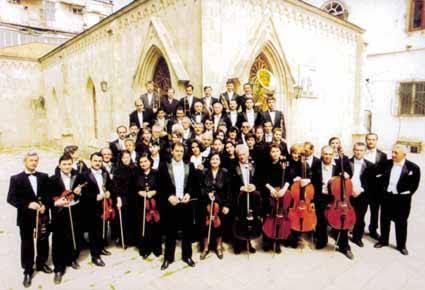|
Summer 1997 (5.2)
To play or order "Classical Music of Azerbaijan" A new series of classical music has just been produced, featuring the original works of Azerbaijan's classical composers. "Classical Music of Azerbaijan" is a collection of six CDs-Symphonic, Ballet, Concerto, Piano, Opera and Chamber Music-a total of 74 works by 15 Azerbaijani composers including Uzeyir Hajibeyov, Muslim Magomayov, Fikrat Amirov, Gara Garayev, Vasif Adigozal and Haji Khanmammadov. Ninety musicians, performing with the Azerbaijan State Symphony Orchestra and the Azerbaijan State Chamber Orchestra, were involved in these recordings. The project was conceived and produced by Azerbaijan International and sponsored by Amoco. The following discussion took place May 3, 1997, in Baku among the principal developers of this project.
Photo: Left to right: Azerbaijan National Symphony conductor Yalchin Adigozalov, Mstislav Rostropovich, Minister of Culture Polad Bulbuloghlu, Project Coordinator Mazahir Panahov and Producer Pirouz Khanlou. A Round-Table Discussion
Above: Azerbaijan National Symphony Orchestra with conductor Yalchin Adigozalov. Right: Azerbaijan National Chamber Orchestra with conductor Yashar Imanov. 1997. Some people thought that when the Soviet Union collapsed, classical culture would disappear, as well. Once the control and direction from Moscow were gone, they thought everything would disintegrate. Actually, there was danger of that happening. We've had no end of difficulties these past eight years-the war, the economy, the refugees, the collapse of a centralized government. All these problems have seriously threatened us. For example, many musicians had to leave the country to continue their musical careers elsewhere. Others had to look for jobs totally unrelated to music in order to survive economically. Vasif Adigozal (Vice-President
of the Composer's Union, Featured Composer, music consultant
for the project and father of the Symphony Conductor, Yalchin
Adigozalov): Today, Azerbaijan's music can finally become known throughout the world. Never before has there been such a systematic recording of our music at such a high level of quality. In the past, pieces were occasionally recorded in Moscow or Georgia (Melodia label). However, usually only one Azerbaijani piece was included in an entire program, and the technical aspects of the recording were disappointing. Now, even though our orchestras may not be equal to those in New York or London, nevertheless, it's important that our national music be recorded by our professional musicians. It's important to us both culturally and politically.
Pirouz Khanlou (Publisher of Azerbaijan International and Producer of this CD Collection): For years, I've dreamed of producing a series of Azerbaijan's classical music. When we first began this project, it was proposed that we record the music in Moscow or Turkey. But I insisted that it be performed and recorded here in Baku. Vasif: I've watched the orchestra mature over these past two months. Professionally, they've leaped forward by at least 15 years. This project was highly motivating for them. They worked night and day. When the great cellist, Mstislav Rostropovich celebrated his 70th Jubilee (May 2), our symphony orchestra performed with him. That, in itself, demonstrates the level we have achieved. Yalchin Adigozalov (Conductor
of the Azerbaijan State Symphony Orchestra): I have several CDs out, myself. But none of them have been recorded in Azerbaijan. Thanks to Amoco, we now have sophisticated sound equipment. We don't have to go elsewhere for future projects. Siyavush Karimi (Studio Director): I had never recorded a symphony orchestra before, so I'll admit I was a bit nervous. I'm glad we were able to record it in Rafig Babayev's studio. He would be proud of what we've accomplished. [Composer Babayev died tragically in a bomb explosion in Baku's Metro in 1994].
The orchestra practiced every
day, even though it was winter. The studio was cold. A few days
before we started recording, we had to start heating up the studio
auditorium since the temperature had to be above 18 C. We had
so many difficulties with the heating. Pirouz: I remember those days when they were practicing. The musicians were sitting there shivering in their coats. Some even wore gloves. Siyavush: Finally, the day we started recording, the electricity was abruptly cut off. That was a big set back for us. Babayev's studio is inside the huge state film studios (Azerbaijan Kino Studio) which it seems owed $150,000 for five years of past due electricity bills. But Vasif Adigozal and Poland Bulbul-oglu used their influence with the Mayor's office and City Council and had the electricity turned back on. When the city heard about our recording project, they gave us two additional weeks to finish it before turning the electricity off permanently. Pirouz: Another thing that took getting used to were the microphones. They were so sensitive. You could even hear when someone breathed. I remember coming in one day and realizing that the orchestra, which had been working all day long, had still not finalized 10 minutes worth of recording. Siyavush: We recorded for 14 days. Sometimes the orchestra worked 9-10 hours a day. After they left, the engineers would start mixing the sound. We hardly slept for two weeks. At the end of those long, tiring nights, we used to go out to eat "khash" (a gelatinized stew made of cows' feet which is considered a delicacy). Yalchin: I've worked with many other orchestras-in Moscow, Turkey and the U.S. But no orchestra is willing to practice more than 3-4 hours for a recording. But here, we worked long hours. We had so little time. We knew the tapes had to be taken to the states to be produced. We weren't willing to sacrifice quality for time. Sometimes, we would take a break to listen to our recording, and then, unsatisfied, we would go back and record it all over again. Pirouz: When the CDs were being produced in California, the manufacturer was amazed at the quality of the performance and recording. He had never heard of Azerbaijan before. Vasif: Perhaps, we don't yet know what the impact of this project will be. But no doubt, this recording will open new doors for Azerbaijani musicians in the future. Elnur Babayev (Artist and Designer of the CD covers, and son of well-known artist, Rasim Babayev): I was given the assignment to design the covers. I tried to find visual ways to express musical images that I felt were suggested by the music. I wanted to create visually what Azerbaijani classical music had created with sound, that is, to build upon Eastern traditional elements (in the case of music-the melody, mode and instruments) and then to synthesize them with western style and form (symphony, ballet, concerto, opera, piano and chamber music). I don't know if I've succeeded or not. But that's what I was trying to do. Vocalist Safura Azimi; Pianist
Elnara Hashimova I tried to develop the concept of black and white for the cover of Piano (No. 4). If you look closely on the Opera cover (No. 5), you can detect the shape of one of our traditional wind instruments, the zurna. The Chamber cover (No. 6) depicts a small fragment of an Azerbaijani carpet. I've tied the six covers together by sprinkling delicate musical notes like star dust across them. Yalchin: I should mention that most of the works in this collection (except some of Hajibeyov's) were composed during the Soviet period. The reason they're not well known is because Azerbaijan's music, though strong, simply was not propagated. But we must never underestimate the great progress that we made during this period. The musical heritage of Azerbaijan and Russia are closely linked. For example, my father (Composer Vasif Adigozal) was Gara Garayev's student, who was himself a student of the great Russian composer, Dmitry Shostakovich. I graduated, myself, from St. Petersburg School of Conductors, which ranks first in the world. That's another legacy of the Soviet system of which I'm very proud. Vasif: Of course, many of these pieces were commissioned for political purposes under the Soviet system. That's an entirely separate issue. Great works of art remain great regardless of the conditions under which they are created. I doubt that Amirov was thinking about politics when he composed the extraordinary pieces like "Azerbaijan" Capriccio. Many Azerbaijanis are musically talented. Brilliant performers are emerging, despite the difficulties our country is experiencing. Most of the soloists in this series are young. For example, Murad Adigozalzade, one of the pianists, is only 22-years-old. He is featured on three of these CDs. What fortune! I want young people to have confidence and hope for the future. Polad: These CDs are vivid proof that Azerbaijan had
a strong tradition in classical music during the Soviet period
and even before. They confirm to the world that music is very
much alive in Azerbaijan today. There's no doubt in my mind that
this project will be regarded as an important milestone in the
cultural history of our country. Back to Index
AI 5.2 (Summer 1997) |










